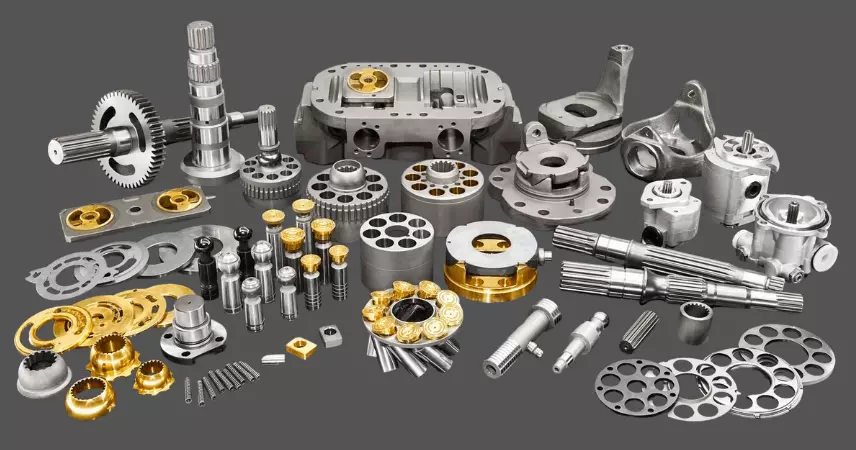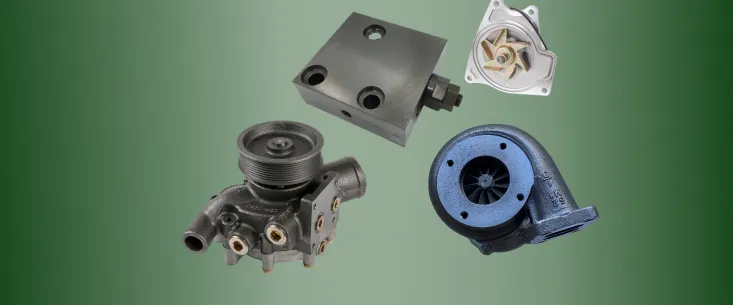+86-135 3388 0668

In the world of hydraulic systems, efficiency and reliability are paramount. This is where the Vickers vane pump shines, playing a crucial role in a wide range of industries, from manufacturing to agriculture and even aerospace. Understanding the technology behind this powerful pump helps explain why it’s become a trusted choice for engineers and operators worldwide.
The Vickers Vane Pump: An Introduction
At its core, the Vickers vane pump is designed to transfer mechanical energy into hydraulic energy, providing the power necessary for various systems. Unlike other types of pumps, vane pumps rely on a rotating set of blades to create a vacuum and pressurize the fluid, making them ideal for applications that demand consistent and smooth performance.

The Vickers vane pump, developed by Vickers Inc., a prominent name in hydraulic systems, is one of the most commonly used pumps in industrial settings. Its design allows it to work seamlessly across multiple environments, handling diverse liquids, from water to oil and even more complex fluid mixtures. This versatility is one reason for its widespread adoption across industries.
How It Works: The Mechanics Behind the Pump
To understand why the Vickers vane pump is so reliable, it’s essential to break down its mechanics. The heart of the pump is the rotor, which houses several blades or vanes that slide in and out of a slot. These vanes create a seal between the rotor and the pump casing, allowing the pump to move fluid with minimal leakage.
As the rotor spins within the casing, the vanes slide out due to centrifugal force, creating pockets of space that trap fluid. The rotating action forces the trapped fluid to move through the pump, creating a pressurized flow that is directed into the hydraulic system. The precise alignment of the vanes ensures that the fluid is transferred efficiently, resulting in less wear and tear on the pump, which directly correlates to a longer lifespan.
What sets the Vickers vane pump apart is its ability to maintain steady flow, even at lower speeds. This makes it particularly beneficial in environments where equipment operates under fluctuating conditions or requires precise control. Its unique design also minimizes the noise typically associated with other pumps, which is a key consideration in applications where noise reduction is a priority.
Applications Across Industries
The versatility of the Vickers vane pump makes it an invaluable asset across various sectors. In the manufacturing world, it powers hydraulic machinery such as presses, injection molding machines, and CNC machines, all of which require a reliable fluid power source to function smoothly. These pumps help keep systems running efficiently, reducing downtime and ensuring that productivity remains high.
In agriculture, Hydraulic pumps are integral to modern farming equipment, from tractors to combines. The Vickers vane pump is known for its rugged construction and ability to withstand the harsh conditions of outdoor environments. It powers the hydraulic systems that operate various attachments on agricultural machinery, such as loaders, seeders, and tillers, making farming tasks more efficient and less labor-intensive.
Moreover, the Vickers vane pump plays a crucial role in the aerospace industry, where hydraulic power is used for everything from aircraft landing gear to control surfaces. Aerospace hydraulic systems demand high levels of precision, reliability, and resistance to extreme conditions. Vickers pumps, with their superior performance and durable design, are more than up to the challenge.
In the automotive sector, these pumps are used in everything from steering systems to braking systems, where steady, controlled fluid movement is necessary to ensure safety and smooth operation. In each of these industries, the Vickers vane pump stands out as a top choice due to its consistent performance, ability to adapt to different fluid types, and ease of maintenance.
Key Benefits of the Vickers Vane Pump
Reliability: One of the most significant advantages of the Vickers vane pump is its reliability. Unlike other pumps, which may experience fluctuations in pressure or flow, the Vickers vane pump operates smoothly, even under varying load conditions. Its design ensures continuous performance, reducing the likelihood of system failures and costly downtime.
Efficiency: The efficiency of the Vickers vane pump is another key selling point. The design of the pump minimizes energy loss, ensuring that the power generated by the motor is transferred effectively to the hydraulic system. This energy efficiency translates into lower operational costs and better overall system performance.
Quiet Operation: The Vickers vane pump operates with minimal noise, making it ideal for environments where noise reduction is important, such as in office buildings or residential areas. Its low-noise operation is a product of its well-balanced rotor and advanced vane design, which reduces vibrations and disturbances during operation.
Durability: Built to last, Vickers vane pumps are known for their durability and ability to withstand harsh conditions. Whether it’s the high pressures found in industrial settings or the extreme temperatures in aerospace applications, these pumps are engineered to perform reliably over time, even in the most demanding conditions.
Choosing the Right Vickers Vane Pump for Your Needs
When selecting a Vickers vane pump for your system, it’s essential to consider factors such as the required flow rate, operating pressure, and the specific type of fluid being used. Fortunately, Vickers offers a range of pumps designed to meet the needs of various applications, from low-pressure systems to high-flow, high-pressure environments. The pump’s design and materials are tailored to meet specific industry demands, ensuring that you get the most out of your equipment.
Maintenance and Care for Optimal Performance
A crucial element in ensuring the long-term performance of your Vickers vane pump is regular maintenance. Like all mechanical systems, the pump benefits from periodic inspection and care to avoid issues and ensure its continued efficiency.
One of the most critical aspects of maintaining a Vickers vane pump is keeping the pump’s internals free from contaminants. Dirt, debris, or water in the hydraulic fluid can cause damage to the vanes and the rotor, leading to decreased performance and increased wear. It’s essential to regularly check and replace the hydraulic fluid to keep the system running smoothly.
Moreover, routine checks for signs of wear, such as excessive noise or vibration, can help catch problems early, preventing more significant failures down the road. The seal and gasket system should also be inspected regularly to ensure there are no leaks, which could lead to a drop in pressure or inefficient fluid flow.
By investing in regular maintenance, you can significantly extend the lifespan of the Vickers vane pump, saving both time and money on repairs or replacements.
Vickers Vane Pumps vs. Other Hydraulic Pumps
When compared to other types of hydraulic pumps, the Vickers vane pump offers several distinct advantages. One of the primary benefits is its simplicity and ease of maintenance. Unlike Gear pumps or piston pumps, which may require more frequent servicing or specialized knowledge, the Vickers vane pump’s straightforward design allows for easier troubleshooting and maintenance.
In terms of performance, the Vickers vane pump offers superior fluid flow consistency, making it ideal for precision applications. Gear pumps, for example, may experience fluctuations in flow rate, which can negatively affect the performance of the machinery. The Vickers vane pump’s design minimizes such fluctuations, ensuring that the system operates efficiently under various load conditions.
Additionally, Vickers vane pumps are known for their ability to handle a variety of fluids, including those with higher viscosities, which can be a challenge for other types of pumps. This flexibility further enhances their value across a wide range of industries.
The Future of Vickers Vane Pumps
Looking ahead, the demand for hydraulic systems that are both efficient and sustainable will continue to drive innovation in the pump industry. The Vickers vane pump, with its reputation for reliability and performance, is well-positioned to adapt to the evolving needs of modern industries. As engineers and manufacturers seek more energy-efficient and environmentally friendly solutions, the Vickers vane pump will likely remain a key component in many hydraulic systems.
The ongoing development of materials and technologies will further enhance the Vickers vane pump’s efficiency, durability, and versatility. These innovations will likely make the pumps even more suitable for high-tech applications, from robotics to advanced aerospace systems, where performance, precision, and longevity are non-negotiable.
The Vickers vane pump is a reliable, efficient, and versatile solution for a wide array of industries. Whether in aerospace, agriculture, automotive, or manufacturing, its ability to deliver consistent hydraulic power makes it indispensable in a variety of settings. By choosing the right Vickers vane pump and maintaining it properly, operators can ensure smooth and efficient operations, improving overall system performance while minimizing downtime and costs. As the demand for high-performance, reliable pumps continues to grow, the Vickers vane pump will undoubtedly remain a cornerstone of hydraulic systems worldwide.
Search
Blog & News